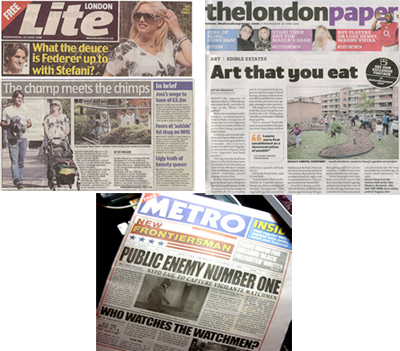
London's freesheets could face extinction with the rise of eReaders.
In London there are a lot of freesheets that are handed out in the morning and evening. People pick them up because they’re going somewhere and mostly need something to entertain themselves while they travel.
Eventually eReaders will become the norm. It’s at least 10 years — and possibly 15 — from being a reality; but it’s something that needs to be considered. Price cuts need to happen, the industry needs to develop standards, etc. But once it does, and they become affordable, more people will own them.
This means free sheets have been granted a reprieve for the time being, but their time is running out. None of London’s freesheets are so good that people would pay for them. Not in print and not online. They survive because they’re there for people rushing to or from work. It’s the same way many college newspapers in the U.S. survive: captive readership.
People consume news digitally differently than they do in print. Once eReaders become more widespread, readers will sit with their Readers and read news or whatever they’d like to read, as they do online. There are some freesheets out there with quality analysis and may have a band of loyal readers. But most, I suspect, do not.
Over at NewspaperInnovation, they’ve translated an article comparing a paid title and freesheet title in Copenhagen:
By reading free newspapers you get an equally good overview of political events than by reading Jyllands-Posten, and an even better idea than reading Ekstra Bladet. Free newspapers cover the same events and with such a solid factual basis that the reader gets aware of the important events in society.
This turns the argument on its head a bit. It doesn’t invalidate the argument that freesheets are heading into a storm if they don’t make big changes. But it does suggest that some freesheets do provide quality analysis, as I noted.
To become viable they’ll need to have developed eReader versions of their paper. But, again, since none of the papers are so good that readers would pay for it, the product would likely run at significant losses in revenue.
For newcomer thelondonpaper, this could prove fatal. Mediaweek reported that the paper remained loss-making in its second year of operation, but that it’s narrowing that gap. This is good news in the boardroom. Stopping the bleeding is critical to the title’s success, but down the road, the march of digital progress remains steadfast.
The free sheets may lose out to the established media outlets who have reader editions. The question then becomes, will readers pay for eReader editions of The Daily Telegraph, The Times, The Guardian, etc? That’s something everyone is arguing over right now.
Since Readers are still considered a relatively new technology, a revenue model hasn’t been developed and fully tested yet. But it’s being worked on.
Today the major paid-for print news outlets are feeling the pinch. They’ve taken their lumps are trying to right the ship. But as technology progresses, more eReaders are developed, and the price drops, they’ll become more ubiquitous.
Unless changes start happening — and at this point figuring out how exactly to change is tough — I believe it’s the freesheets that will suffer the most from the march of digital progress.
Filed under: freesheets, newspaper websites, new media, newspapers
Recent Comments